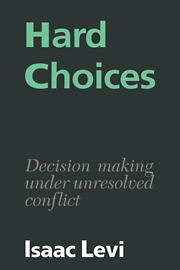Book contents
- Frontmatter
- Contents
- Preface
- 1 MORAL STRUGGLE
- 2 DILEMMAS
- 3 VALUES IN SCIENTIFIC INQUIRY
- 4 CHOICE AND FOREKNOWLEDGE
- 5 VALUE STRUCTURES
- 6 VALUES REVEALED BY CHOICES
- 7 UNCERTAINTY AS A SOURCE OF CONFLICT
- 8 CONFLICT AND SOCIAL AGENCY
- 9 DISTRIBUTING BENEFITS
- 10 UTILITARIANISM AND CONFLICT
- 11 SOCIAL CHOICE THEORY
- 12 CONFLICT AND INQUIRY
- Notes
- Bibiliography
- Name index
- Subject index
- Frontmatter
- Contents
- Preface
- 1 MORAL STRUGGLE
- 2 DILEMMAS
- 3 VALUES IN SCIENTIFIC INQUIRY
- 4 CHOICE AND FOREKNOWLEDGE
- 5 VALUE STRUCTURES
- 6 VALUES REVEALED BY CHOICES
- 7 UNCERTAINTY AS A SOURCE OF CONFLICT
- 8 CONFLICT AND SOCIAL AGENCY
- 9 DISTRIBUTING BENEFITS
- 10 UTILITARIANISM AND CONFLICT
- 11 SOCIAL CHOICE THEORY
- 12 CONFLICT AND INQUIRY
- Notes
- Bibiliography
- Name index
- Subject index
Summary
Conflict and deontic logic
B. van Fraassen (1973: 6) has argued that the presence of unresolved conflict in a decision problem confounds the “axiological thesis” that “what ought to be is exactly what is better on the whole”. As the preceding discussion indicates, I agree with van Fraassen on this score. Moreover, I agree that rational agents often find themselves in conditions of unresolved conflict.
Van Fraassen also holds that a certain “classical” principle of deontic logic precludes the existence of unresolved conflict. According to that principle, when A and B are not jointly feasible, it cannot be obligatory that A and obligatory that B. Van Fraassen (1973: 12) comments, “I can only conjecture that the original devisors of deontic axioms had a certain ethical bias; perhaps they were utilitarians, or accepted some other axiological creed”.
In my view, there is not the slightest reason to understand the offending principle as precluding the existence of unresolved conflict. My motive for insisting on this is not to save the “classical” principle. That principle is too trivial to be either in need of or worth rescuing. It seems to me, however, that there is an important misunderstanding about unresolved conflict lurking behind van Fraassen's view (a view he shares with many others) which ought to be clarified.
I shall suppose that an agent's decision problem is representable by a set of feasible options from which, as far as the agent knows, he must choose exactly one.
- Type
- Chapter
- Information
- Hard ChoicesDecision Making under Unresolved Conflict, pp. 20 - 35Publisher: Cambridge University PressPrint publication year: 1986



